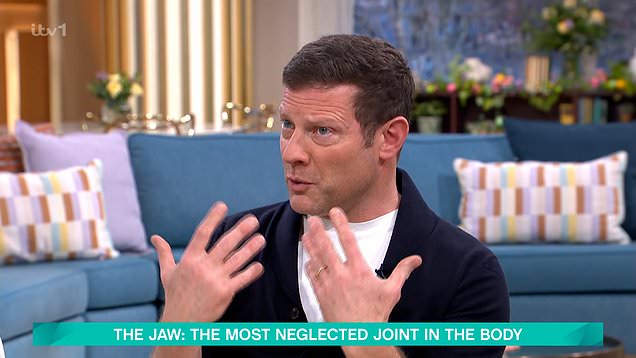Dermot O’Leary Says He Ignored ‘Massively Painful’ Health Issue Because ‘I’m a Man’

Dermot O’Leary, the renowned presenter known for his charisma and charm, has bravely opened up about a health struggle that many men may overlook — temporomandibular joint (TMJ) disorder. This condition, which can lead to significant discomfort and pain, became a personal challenge for O’Leary and was discussed during his appearance on “This Morning.” His candidness reflected not just his journey but also highlighted a broader societal issue where men often feel compelled to ignore health concerns.
The Unexpected Onset of TMJ Disorder

At the age of 51, O’Leary found himself grappling with unexpectedly severe jaw pain. What started as a mild annoyance quickly escalated into a condition that made simple actions, like eating, painfully difficult. This painful experience caused him to reflect on the stigma surrounding male vulnerability when it comes to health issues. Feeling societal pressure to appear tough, he initially hesitated to seek medical help, which is a shared experience for many men who dismiss their health symptoms in a bid to conform with traditional notions of masculinity.
Upon finally visiting a healthcare professional, O’Leary was directed to physiotherapist Krina Panchal. Her assessment revealed that his TMJ disorder was more muscular than joint-related, indicating that treatment might be more straightforward than initially feared. It served as a reminder that seeking help is crucial and that many individuals, particularly men, should feel empowered to address their health concerns without reservation.
The Impacts of TMJ Disorder

TMJ disorders can often go undiagnosed for extended periods, primarily due to the reluctance of individuals to seek help. This condition doesn’t only involve pain in the jaw but can also lead to secondary symptoms, including neck and shoulder tension, chronic headaches, dizziness, and even auditory issues such as earaches. O’Leary’s experience aligns with that of many others who deal with TMJ, emphasizing the need for awareness around this health issue and proper treatment options.
Treatment for TMJ can vary widely based on the severity and underlying causes. Initially, many patients might benefit from conservative measures like physiotherapy, dietary changes, and stress management techniques. For O’Leary, these initial steps were deemed appropriate, while more invasive options, such as Botox injections or even surgical interventions, remain an avenue for those whose symptoms persist despite conservative treatments. Incorporating softer foods into one’s diet and practicing techniques to reduce stress can also significantly help in managing TMJ symptoms.
Encouraging Open Conversations About Health Issues

O’Leary’s revelation has sparked conversations about the importance of addressing health challenges without stigma. He isn’t alone in his experience; other public figures, such as former BBC Radio 2 presenter Zoe Ball, have similarly spoken out about their struggles with TMJ disorder. This growing awareness encourages a culture where health is prioritized over societal expectations of masculinity.
Experts emphasize that being proactive about health is vital, asserting that pain should never be brushed aside. While dietary adjustments and physiotherapy are effective for many, long-term suffering can necessitate further clinical intervention. Ignoring such critical health issues can lead to long-term consequences, heightening the necessity for individuals to take their symptoms seriously.
Conclusion

In a world where discussing health issues openly can still be daunting, Dermot O’Leary’s transparency about his TMJ disorder serves as a rallying call for men everywhere. It underscores the message that seeking help is a sign of strength, not weakness. If you or someone you know is experiencing similar health challenges, don’t hesitate to reach out to a healthcare professional. Taking the first step in addressing your health could lead to more manageable solutions and a brighter future.